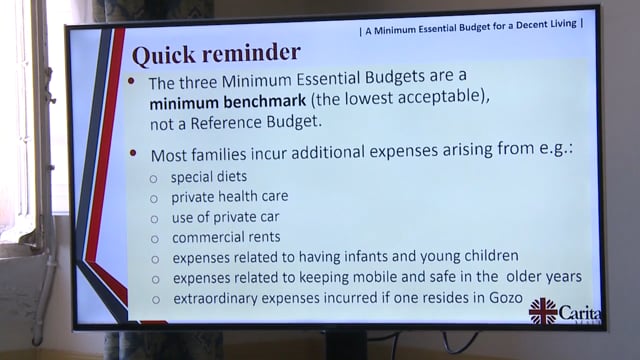[WATCH] Caritas calls for minimum wage rise in study on household budgets
Caritas, Alternattiva Demokratika urge government to increase minimum wage following revealing study on minimum essential budgets


Caritas urged government to increase the minimum wage, after a study by the Church organisation laid bare how some families cannot even keep up with even the most basic costs of living.
“We won’t venture an estimation as to how much the minimum wage should increase by, but the study clearly shows that some families with one breadwinner on the minimum wage cannot meet everyday expenses,” Caritas director Leonid McKay told a press conference. “Ideally the minimum wage should increase gradually over a three year period.”
He argued that an increase in the minimum wage will ultimately boost the economy, as people will use the extra money to consume relatively basic items.
Caritas’ call was immediately welcomed by Alternattiva Demokratika, who said that the minimum wage – currently €672 a month - doesn’t guarantee a decent living.
“The minimum wage has never been reviewed since its introduction in 1971,” AD spokesperson Mario Mallia said. “It is obvious that 45 years later, the dignity of workers at minimum wage means that it should be reviewed.”
Prime Minister Joseph Muscat said in a tweet that he would welcome a debate on the minimum wage.
Caritas’ study found that a couple with two children requires a minimum of €11,466 a year to live a decent life, while a single parent with two children requires €9,197 and an elderly couple on a pension requires €6,527.
Food was the most significant cost – accounting for €6,211 out of the first family’s budget, €4,604 out of the second family’s budget, and €2,945 out of that of the retired couple.
McKay noted that the price of food has shot up by around 16% since the last time Caritas conducted a similar study back in 2011.
Inflation on food was 16% between 2011 and 2015.
The study was based on the assumption that the low-income earners live in social housing, are Pink Card holders, and receive the maximum of state subsidies and benefits applicable to them – including food and medicine aid and energy rebates. It also assumes that the people are healthy, that they make use of public health, education and transport services, and that their leisure activities are free.
They essential costs taken into calculation were housing, food, clothing, personal care, health, education, leisure, transport, household goods and laundry, Internet and mobile phones.
They reflect market prices for November 2015, directly obtained from shops and supermarkets.
Food prices were based off menus designed by nutritionists for people on a tight budget who want to keep healthy.
The essential costs don’t include “frills” such as holidays, alcohol, book purchases, club memberships, donations, tobacco, car maintenance costs, pocket money, hi-fi equipment, newspapers, pet costs, games and toys, watches, insurance cover and gifts.
Neither does the study take into account costs related to special dietary requirements, disability, mental health or chronic conditions, specific needs of ethnic groups, and ferry prices for Gozitans.






.jpg)
















